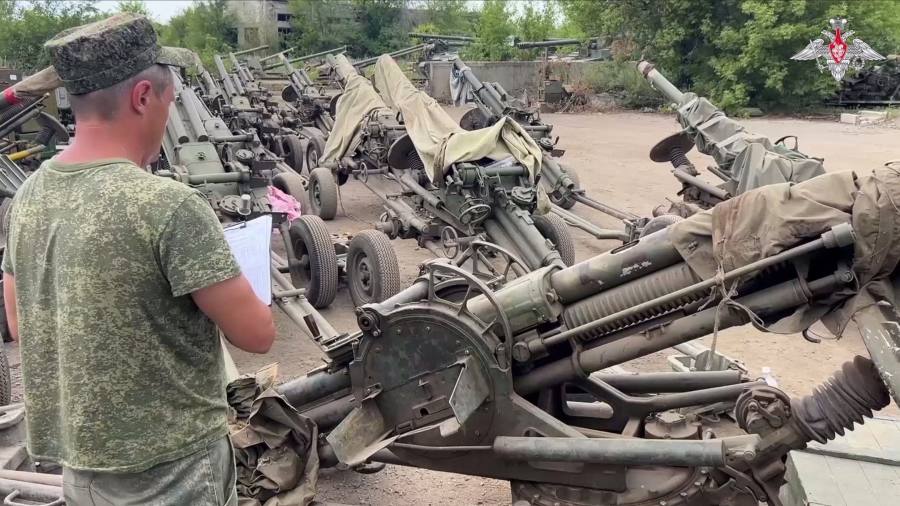Receive free Russian insurrection updates
We’ll send you a myFT Daily Digest email rounding up the latest Russian insurrection news every morning.
Russia’s Wagner group has begun to hand over its arms and heavy equipment as part of a plan to dismantle the paramilitaries following their failed insurrection last month, according to the defence ministry.
Wagner has handed over more than 2,000 pieces of equipment, including tanks, armoured vehicles, artillery and rockets, air defence systems, howitzers, and anti-tank weapons, the Russian defence ministry said on Wednesday.
The handover is part of a deal to dismantle the group after its founder Yevgeny Prigozhin led a revolt against the Russian army’s top brass for a day in late June. The ministry said it was already “finishing” the transfer “according to the plan”, without elaborating.
Wagner, whose men have appeared to mostly remain at its bases in eastern Ukraine since the revolt, has not commented on the handover. Prigozhin has said the group was prepared to surrender its heavy weaponry before its rivalry with the army sputtered out of control in June.
The first coup attempt in Russia for three decades, Prigozhin’s aborted insurrection was the most significant blowback for President Vladimir Putin nearly a year and a half into his full-scale invasion of Ukraine.
As Russia’s war effort sputtered, Wagner’s longstanding spat with the defence ministry over money and supplies spilled into the open. Prigozhin emerged as the leader of a hardline faction that began to question Russia’s handling of the war.
When Putin backed defence minister Sergei Shoigu’s efforts to incorporate Wagner in the regular armed forces, Prigozhin refused and launched a “march of justice” to oust its leadership.
In the brief revolt, Wagner’s forces captured official buildings in the southern city of Rostov and came within 200km of Moscow, killing at least 13 Russian servicemen when they shot down a plane and several helicopters.
Prigozhin then agreed to a deal brokered by Belarus’ president Alexander Lukashenko. Under the terms of the agreement, the warlord would relocate to Belarus and stand down his forces, who faced the choice of signing up with the ministry or following him in exile.
Since then, Putin has boosted loyalists such as Shoigu while shaking up Russia’s security services amid a search for those who failed to prevent Wagner’s revolt — or privately sympathised with it.
On Wednesday, a senior lawmaker said Sergei Surovikin, a general who has not been seen in public since the failed mutiny, was “resting.”
Surovikin, the former commander of Russia’s invasion force in Ukraine and one of Prigozhin’s closest allies in the military, was detained in the aftermath of Wagner’s mutiny amid the security services shake-up, according to people familiar with the matter.
The Kremlin and the defence ministry have not commented on Surovikin’s whereabouts, while the people familiar with the matter said it was unclear whether Surovikin was simply being held for questioning or charged with aiding the revolt.
Andrei Kartapolov, formerly a senior defence ministry official who has said he commanded several Wagner covert operations before joining parliament, told reporters on Wednesday that Surovikin was “not available right now”, according to a video posted on Shot, a news outlet on social media app Telegram.
In that time, instead of staying in Belarus, Prigozhin has returned to Russia, according to Lukashenko.
The Kremlin said this week that Putin held a three-hour meeting with Prigozhin and Wagner’s top commanders on June 29, five days after the revolt, while the warlord’s private plane has more recently been spotted flying between Moscow and St Petersburg on flight-tracking websites.
The defence ministry on Wednesday made two thinly veiled references to its disputes with Wagner, indicating the rivalry had not been fully put to rest.
It said “dozens” of pieces of equipment had “never been used in combat conditions” and that Wagner handed over 2.5 tonnes of munitions, casting doubt on Prigozhin’s claims that Shoigu was deliberately starving his troops of supplies.
It remains unclear how Russia will redistribute the group’s financing, which Putin said amounted to more than $2bn in the last year alone.
Speaking on the sidelines of the Nato summit in Lithuania on Wednesday, UK defence secretary Ben Wallace drew attention to the Wagner finances.
The Kremlin “announced that they had stopped paying Wagner, which was remarkable given that they had pretended they had nothing to do with Wagner”, Wallace said. “If you stop paying mercenaries it doesn’t usually work out well. Mercenaries will not sit and do nothing.”
Read the full article here





